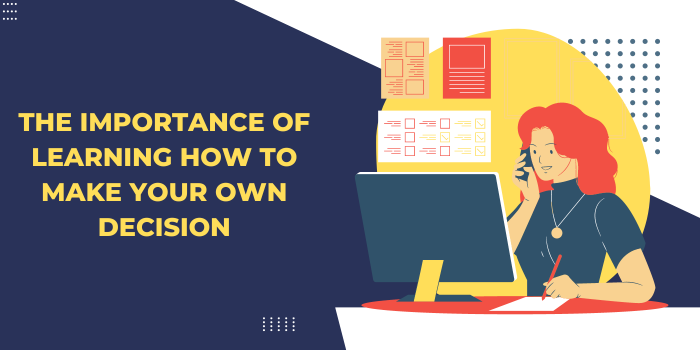Introduction
Are you trying to make a decision but cannot decide on the direction? If so, then don’t worry; this decision-making guide will help you find your way.
Decision-making is an integral part of life, and deciding between yes or no for any decision can be a tough task. However, either of the binary outcomes makes it easier for users to make their choices.
In this article, you will see the importance of being able to make your own decisions and how saying yes to challenging decisions can impact one’s mentality. It’s not just about choosing; it is about determining your future, developing yourself
The Importance of Learning to Decide for Oneself
In today’s pool of opportunities, making correct decisions is not just a skill but the gateway to freedom and personal development. It is one of the ways to develop oneself and become stronger.
Whatever decision you take, regardless of its magnitude or insignificance also helps you discover more about your ideals and preferences. This skill turns out to be a compass that shows people how they can cope with various difficult situations in their lives. Choosing doesn’t only mean concluding; it also means giving people a feeling of power and responsibility that allows them to change their lives consciously directed by purpose and belief.
Best Tips on How to Make Your Own Decisions
Choices are inevitable in life and the ability to make decisions on your own enables one manages his or her way better. Here are some important ideas to help you make solid, confident decisions:
- Define Your Values:
When you are making decisions, take only your basic values into consideration. First, knowing what matters most to you provides a starting point for decisions that reflect your values and desired outcomes.
- Gather information:
A rigorous study results in informed assumptions. Gather relevant information, evaluate the pros and cons, and think about possible outcomes. This approach gives a deep understanding of the issue.
- Trust your instincts:
Intuition is a valuable guide. Trust your intuition and instincts. Your early emotions could regularly guide you on what is true with your original self.
- Consider the Long-Term Effects:
Speculate on the future implications of your decisions. Select ways to assist you in reaching your long-term goals and making yourself happy.
- Seek Input, Not Validation:
Feedback, even if it is counsel’s can be helpful but get different perspectives instead of rebuilding assurance. Having other people around with a multitude of perspectives may give you awareness and some very valuable insights.
- Embrace imperfection:
Understand that there is no perfect decision. Embrace the inadequacies and uncertainty associated with such a decision. Recognize that learning from successes and failures is critical to personal growth.
- Prioritize Self-Care:
Before making decisions, be mentally and emotionally ready. Clarity and judgment are also enhanced through observation of effective self-care, such as enough sleep and management of stress.
- Set Realistic Expectations:
Define the expectations for choice outcomes. Not all decisions will work quickly, but each contributes to your story.
- Learn from Past Decisions:
Consider the decisions you’ve made before, whether they were positive or negative. Determine trends, takeaways and opportunities for development. This backward process induces resilience and knowledge.
- Take Ownership:
Last, acknowledge the decisions you have made. Regardless of success or failure in consequence of proficiency and whether responsibility when they promote a sense authority and accountability.
The Impact of Decisions
Our lives are a canvas, and every choice we make is a new stroke of the masterpiece that is our life. Decisions can have a significant effect on our lives; they determine the path of our voyage and guide the shades of what we experience.
Personal Growth and Development
Each decision, whether big or small, plays a catalyst role in a person’s development. When we challenge ourselves to overcome our fear of the unknown and explore new options, we are opening a door that allows us to discover ourselves. In these choices, we are taught our capabilities, limitations, and even a limitless zone that is present in all of us.
Building Confidence
The answer to success in decision-making is a confidence-building workshop we attend every day. Each right choice we make becomes a stamp of pride, reminding us that we can think for ourselves. Confidence is not an outcome of zero mistakes but of getting up every time one falls.
Learning from Mistakes
Mistakes should not be seen as obstacles that stop; instead, they should be seen as stepping stones that help. And, unfortunately, mistakes in decision-making provide us with priceless lessons, first, about ourselves and then about the world.
Conclusion
When you can make your own decisions, you control your life. Each “yes” and “no” contributes to a balanced path of growth, adaptability, and self-realization. While navigating this path, keep in mind that imperfection is the backdrop of our successes. If you are wandering the maze of options, keep in mind that this choice is yours to make, and only you can choose the direction for yourself.
